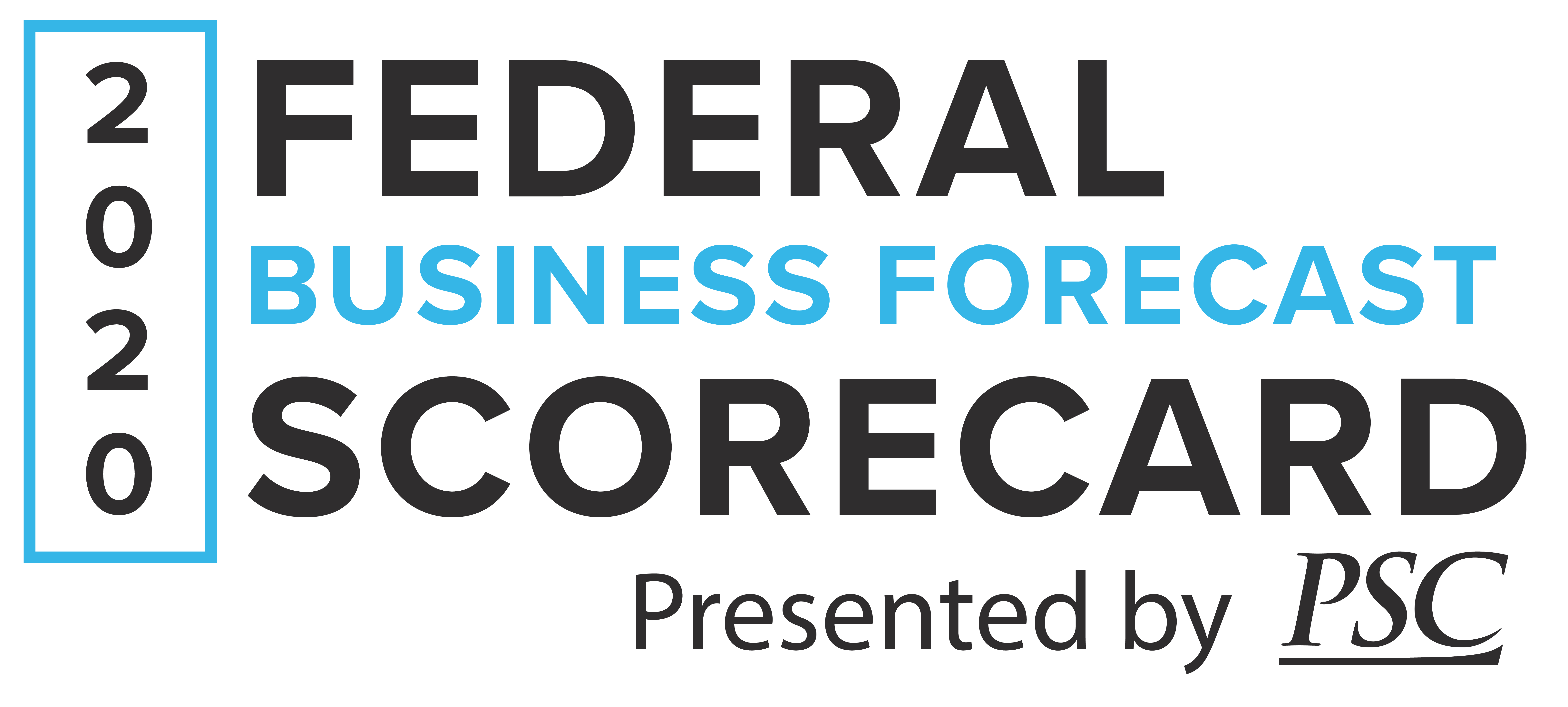| PSC Ranks Agency Business Forecasts Value to Contractors |

Arlington, Va. (July 13, 2020) The Professional Services Council (PSC) today released the 2020 edition of PSC’s Federal Business Forecast Scorecard during its annual Federal Acquisition Conference. The Scorecard examined procurement forecasts, which agencies use to provide valuable information on projected needs, from a total of 60 federal agencies and components. This year’s Scorecard recognized select agencies for the improvements made to their forecasts following last year’s first-of-its kind evaluation by PSC.
Key highlights from the 2020 PSC Federal Business Forecast Scorecard include:
• Naval Information Warfare Systems Command (NAVWAR), formerly SPAWAR, showed the most significant improvement over their 2019 evaluation. Their straight-forward, thorough forecast document is easily navigated and includes in-depth information about anticipated security clearance needs and other program requirements. The information made available in their forecast exceeded expectations and distinguished them as this year’s model for success.
• USAID and the Department of Education were rated highly, matching their respective score from the 2019 edition.
• Eight components of the Department of Homeland Security (DHS) scored in the “good” category, an improvement over the 2019 scores where five DHS components achieved the rating.
• Of the 60 agencies reviewed, 28 ranked as “needing improvement.”
• Air Force, CDC and components of USDA were ranked in a different category, “WTF?” – or “Where’s The Forecast?” based on their absent forecasts.
Agencies were scored against a list of 15 “key attributes” that PSC determined in 2019 must be included in an effective forecast. Among the most important of those attributes are identified action/award type, anticipated solicitation date, and set-aside status. Successful forecasts offered clear project and award descriptions, with clear dollar estimates and ample information for users to make informed decisions about proposal investments and costs.
“PSC is pleased to see substantial improvement in several agencies even as we continue to encourage all federal agencies to refine the information made available to industry,” said Alan Chvotkin, PSC Executive Vice President and Counsel. “Clear project needs enable contractors to plan for the needed personnel and resources to compete successfully for U.S. government contracts, thus resulting in better proposals and shorter award decision timelines allowing programs to commence in timely fashion. The benefit to agencies is that companies can prepare better and earlier in the procurement lifecycle to perform on contracts. Agency needs are met, measurable results are achieved, and competition keeps costs down.”
Last year, PSC categorized the forecasts of 48 agencies into three classes (good, fair and needs improvement), based on these same 15 key attributes. PSC then engaged with many of the lower rated agencies as well as the Office of Federal Procurement Policy (OFPP) within the Office of Management and Budget (OMB) to discuss how agency business forecasts can be improved.
“An important element in OFPP’s efforts to reduce friction in the acquisition system is improving how we communicate our needs to industry. We need to do this in a way that builds and diversifies our supplier base, sparks innovation, and delivers value to taxpayers,” said Dr. Michael Wooten, Administrator, Office of Federal Procurement Policy, Office of Management and Budget. “OFPP recognizes the importance of developing clear agency procurement forecasts in this process, and appreciates PSC’s helpful input on agencies’ forecasts as we modernize our business practices.”
The 60 agencies in the 2020 edition represent only a sample; not every publicly available Business Forecast was reviewed. Several buying agencies do not have publicly available forecasts.
“Highlighting the importance of successful agency forecasts in the overall procurement lifecycle is critical to our member companies, particularly given that forecasts are often the first step in programmatic activity,” Chvotkin continued. “We look forward to working with our members, the various agencies, OFPP, and Congress, to continue to improve the government’s vital business outreach effort.”
Click here to view a PDF of this release.
###
Media Contact:
Pheniece Jones
Director, Media Relations
703.875.8974
media@pscouncil.org
About PSC: PSC is the voice of the government technology and professional services industry. PSC’s more than 400 member companies represent small, medium and large businesses that provide federal agencies with services of all kinds, including information technology, engineering, logistics, facilities management, operations and maintenance, consulting, international development, scientific, social, environmental services, and more. Together, the trade association’s members employ hundreds of thousands of Americans in all 50 states. Follow PSC on Twitter
@PSCSpeaks. To learn more, visit
www.pscouncil.org.